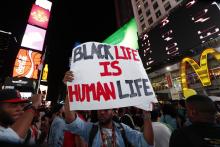sean bell

One month ago, the city of Ferguson, Mo., was violently shaken by the shooting death of an unarmed black man whose name is Michael Brown, Jr.
This is not the first time we’ve stood in this place. Michael Brown has been added to the roll call of unarmed black people killed by those hired to protect and to serve. His name joins the names of:
John Crawford , an unarmed Ohio man gunned down inside of a Walmart while examining a toy gun sold in the store.
Eric Garner , an unarmed New York man killed, after stating several times that he was having difficulty breathing, by an officer using an illegal choke hold.
Sean Bell , an unarmed New York man shot multiple times outside of the venue for his bachelor party the night before his wedding.
Oscar Grant , an unarmed Oakland man who was handcuffed, face down, before he was fatally shot.
And so many more black lives, both male and female, ended by the reflexes of a legal system designed to police some and protect others.
So why did the killing of Michael Brown, Jr. ignite such a firestorm of rage in a region and a nation where slain black bodies are commonplace?
This is not one of those neighborhoods that cause political analysts to pontificate over “how something so tragic could happen here.”
These are not deaths that leave communities and congregations struggling to find deeper meaning and psychological factors that might have contributed to the tragic loss of life.
As a matter of fact, since the death of Michael Brown, there have been two killings of black men with documented mental challenges, Ezell Ford of Los Angeles and Kajieme Powell, killed only a few miles from the site of Michael Brown’s death. Yet there have been no roundtable discussions of the role of mental illness in our society sparked by these deaths.
What made Michael Brown’s death different?